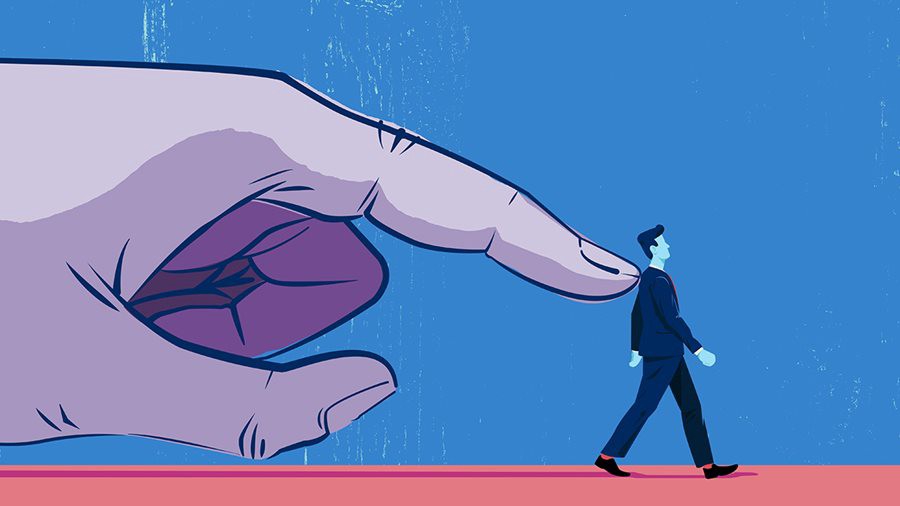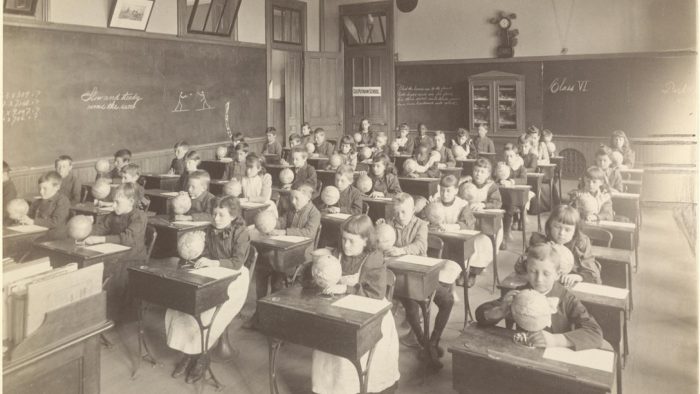The federal government is poorly positioned to solve our national problems.
A Simple Repair for our Higher Education Mess

The way out is through accountability.
As Lord Acton told us, absolute power corrupts absolutely. But why? Primarily because it makes a person or an institution irresponsible. Lack of accountability corrupts. College administrators and faculty in America have been free from meaningful accountability for nearly a century, and, as a direct consequence, college students have also been “liberated” from the burdens of substantive curricula and serious study through grade inflation and workload deflation. Massive government subsidies and profligate loans to students have also liberated universities from the disciplines of market supply and demand. We should not be surprised, therefore, to find our colleges and universities facing the greatest crisis in their history.
The crisis is multifaceted. First, there is the collapse of academic standards. In thirty years, the percentage of As and A minuses has risen from 9 to 41%, and the rate of inflation is accelerating. As Richard Arum and Josipa Roksa documented in Academically Adrift: Limited Learning on College Campuses (2010), the average time studying has plummeted in 25 years from 30 hours a week to a mere 15 hours—and this is based on self-reporting! Arum and Roksa report that 44% of college students show no measurable improvement in their cognitive skills over the course of their 4-6 years in college. The students fill their abundance of leisure with binge drinking/smoking, erotic pursuits, and, often for academic credit, political activism.
Our nation has parked over half a million young people in Ph.D. programs, mostly with dismal career prospects. We employ over 1 million faculty members. The system generates millions of man-hours of useless research for articles that, as Emory Professor Mark Bauerlein has documented, are never read.
The costs of higher education have soared. For over a generation, tuition and fees have run at twice the rate of inflation. Student debt stands at over a trillion dollars, a burden comparable to total housing mortgages. In no other sector have costs risen so high with no improvement in quality. Proponents of higher education complain that state support for colleges has fallen—but it has fallen only as a percentage of the greatly inflated cost.
Enrollment in the core subjects of the humanities—English, history, and philosophy—has plummeted. In addition, the college curriculum has become increasingly fragmented and incoherent. A true core curriculum in science and Western civilization has been universally replaced by distribution requirements, asking students to take one course from each column in a meaningless, unstructured spreadsheet. Survey courses and required introductory courses of every kind have virtually disappeared from traditional subjects. What students are not required to learn, teachers are not required to teach. Course offerings reflect the idiosyncratic research interests of the faculty, not the educational value to students.
Nature abhors a vacuum. Once the old standards and purpose disappeared, academics sought a new purpose: progressive politics. Most liberal arts fields now define their educational purpose in terms of social justice: eradicating inequality, promoting sexual diversity and “transgressivity,” and inculcating racial identities. Conservatives, virtually an extinct species within elite universities, are systematically excluded by the academic gatekeepers on admissions and hiring committees, and self-excluded given their lack of interest in the political purposes of the fields. If we measure diversity by intellectual, cultural, and religious orientations, higher education is the least diverse segment of our society. The Democrat-to-Republican ratio is ten to one in most humanities and social science fields (30 to one in fields like anthropology and sociology), and the proportion of conservatives is even lower.
In a 2017 poll conducted by Pew Trust, 58% of Republicans view higher education as a negative influence on the country. This is a profound shift in sentiment: until very recently, college ranked along with motherhood and freedom of speech as one of our unassailable sacred cows. What has happened? We can point to political correctness, intolerance of dissenting voices, and the monopoly of leftist thought, but all of these have a deeper explanation. The liberal arts in America have abandoned and then forgotten their defining purpose, selling their sacred role as transmitters of civilization for a bowl of the warmed-over porridge that is progressive politicking.
The Crisis of Accountability, and a Solution
All of these myriad problems have a common cause: the lack of educational accountability. There is no meaningful, widespread, and disinterested evaluation of what students have learned (and, more realistically, not learned) in the nation’s educational institutions. The solution is obvious: mandatory exit exams. Many states, including my own state of Texas, have salvaged a failing K-12 system by introducing accountability in the form of exit exams. In any large, complex social system, we get what we reward and we reward what we can measure. So, in order to re-orient the system from indoctrination to teaching, we must measure student learning and reward effective teachers.
The present incentive structure is one of peer validation. Individual professors are evaluated solely on the basis of what peers in their field think about their published research. Whole departments and universities are similarly judged only on the basis of the opinions of peer institutions. This dominance of peer evaluation is what has enabled cultural Leftism, following the prescriptions of Antonio Gramsci, to take over one field after another.
Once the Left is in control, its position is unassailable, since Leftists simply validate each other’s professional excellence and disqualify all critics. This is beginning to happen even in the hard sciences: global climate-change alarmism and other forms of ecological extremism are becoming entrenched. A system of pure peer evaluation constitutes a situation of collective irresponsibility, and irresponsibility breeds ideology, fads, and shared forms of hysterical madness.
We must effect a shift from peer validation to validation by measurable results. We can’t use long-term results (income, employment) or nebulous goals (happiness, virtue): these are too far removed from the practice of teaching and too unpredictable. Education glasnost must take the form of entrance and exit examinations for students. In addition, we must learn from the mistakes made in K-12 testing: the tests must involve low stakes for students and incorporate high standards. Their primary purpose should be to evaluate the quality of teachers, not to provide a barrier for students.
This will involve a two-pronged approach: mandatory local tests, and optional national tests.
Local Tests
The mandatory local tests must be graded in a double-blind fashion, where graders don’t know the identity of students (nor the identities of the students’ teachers), and students don’t know the identities of graders, as is the case in final degree examinations at Oxford and Cambridge in the United Kingdom. The tests must also be transparent: curricular standards and grading rubrics must be made available to the public and must be periodically approved by recorded vote of the trustees. Past questions and random samples of graded answers (without names of students) must be posted online. Finally, the tests should be used to evaluate, in a value-added approach (using entrance exams as baselines) the effectiveness of individual programs, instructors, courses, and instructor-course combinations. All of this information must be made available to the public.
In order to motivate students, the test results (including percentile ranking) could be included in official student transcripts. The tests could be created and graded by consortia of colleges, each with at least ten participants. Each college would be free to join colleges with similar missions and philosophies. Colleges that opt out of such consortia would have to use GRE Subject Exams for all graduates. The GRE board provides well-designed and empirically valid exams in nearly all traditional subjects; in order to meet demand, the suite of exams could easily be expanded.
All college students should be required (at a point prior to graduation determined by their college) to take the Collegiate Learning Assessment. The CLA is an excellent exam that measures precisely the skills of critical thinking and rational analysis that universities claim to be honing. Hundreds of colleges currently use CLA results for randomly selected students as a means of internal evaluation. We should make the CLA universal and publicize the results.
The relative rank (both absolutely and on a value-added basis) of each department on each campus could then be made public.
National Tests
In addition to these local, consortium-based exams in major subjects and to the GRE Subject Exams and CLA, the federal government could create a national honors exam in the masterworks of Western civilization, with optional specializations in literature, history, philosophy, classical and modern languages, and political, economic, and social theory. The curriculum and standards would be defined by a national board of eminent conservative scholars, hand-picked by the president.
We could provide rich rewards for students earning high scores in the national exam, including automatic admission to the professional or graduate school of one’s choice. We could also reward the teachers of student prizewinners. Most importantly, having a specified number of students win first-class honors would become a prerequisite for receiving any federal grants. This would break the peer-approval cartel in scientific and scholarly research, rewarding instead teachers with proven record of student success in mastering a traditional, classical curriculum.
The national honors exam would result in recognition for colleges and universities that excel, both absolutely and in terms of value added, in preparing students for the exams. This would include non-traditional colleges, including online, for-profit, and associations of independent scholars and tutors. The establishment of a private, non-profit foundation with a self-perpetuating board of directors for creating and administering the tests, ideally depending entirely on private donations and student fees, would enable the national honors exam to become independent of national politics and self-sustaining for the long run.
What We Stand to Gain
The advantages of such a system would be manifold. It would:
- shift institutional priorities from useless publishing back to student learning.
- eliminate pressure for grade inflation and work deflation with its attendant focus on mere entertainment value.
- incentivize colleges to raise academic standards, making grades and degrees more valuable as real indicators of learning.
- enable conservative scholars to win positions and promotions through the objective measure of talent for teaching.
- increase the cost for colleges of enforcing political correctness and wasting time in propaganda.
- eliminate the substitution of political activism and “experiential learning” for real scholarship.
- make the standards and curricular content of colleges transparent to public scrutiny.
- enable students to make better informed decisions about college choice, based on which institutions are most likely to enable students like them to excel.
- force colleges to compete on the basis of educational value and not through inflated costs and luxuries (e.g., gourmet dining and climbing walls).
- winnow out useless programs and departments that fail to make a measurable difference in student performance, reducing substantially the waste of public and private funds.
- reduce the value of prestige, cutting down on costly bidding wars for “big names” like Nobel Prize winners and academic celebrities.
But do we really want our institutions of higher education doing nothing but “teaching to the test”? It all depends on the test! Oxford and Cambridge having been doing pretty well teaching to the test (Honours Schools Examinations) for the last 150 years. Bad tests can ruin an educational system: if they set a low bar that everyone is expected to pass (as is the case for the K-12 STAAR exams in Texas), then they deprive better students of the opportunity to learn more. However, a good exam, one that tests the whole range of achievement from zero to exceptional, can make all the difference between a failing system and a thriving one.
But can standardized tests measure the kind of academic achievement provided by our modern universities? Our law schools, medical schools, and graduate schools all think so, or they wouldn’t be requiring LSAT, MCAT, and GRE scores. A well-designed standardized test, like the CLA or GRE Subject exams, can test abilities at a high level, including skills at problem-solving, technical analysis, and logical reasoning. And nothing prevents the university consortia from making use of rigorous essay exams, as they do in Oxford and Cambridge.
What prevents radicals from skewing the examinations toward cultural Marxist “critical” theories? In principle, nothing—but the standards and questions must be made available (post facto) to the general public. This would provide a check on ideological narrowness. In addition, anything that bases academic standards on a fixed set of texts, even if these texts include radicals like Marx, Beauvoir, or Foucault, provides opportunities for non-ideological scholars to prosper, since they would be free to teach the texts from a critical perspective, while conveying the substance of the theories to their students. Substantive engagement, even with erroneous theories, has real pedagogical value. And the mere presence of conservative and moderate scholars in elite colleges will have over time a moderating effect.
Fortunately, all of this can be accomplished without getting any legislation through our arthritic, do-nothing Congress. The Department of Education can use regulatory rules to require the system of exams as a condition of receiving federal loans and subsidies. The IRS can adopt the policy as defining the public good for the sake of accepting the tax-exempt and tax-deduction status of colleges and universities.
When America’s colleges were mostly small, serving regional, multi-generational, and cohesive communities, accountability to that community was reliable and organic. Now, the higher education system incorporates a million faculty members, an equal number of administrators and staff, and millions of students in a nationwide, highly subsidized market. Real accountability requires a coordinated effort and a national effort. Otherwise the system will continue to careen uncontrollably toward the cliff.
The American Mind presents a range of perspectives. Views are writers’ own and do not necessarily represent those of The Claremont Institute.
The American Mind is a publication of the Claremont Institute, a non-profit 501(c)(3) organization, dedicated to restoring the principles of the American Founding to their rightful, preeminent authority in our national life. Interested in supporting our work? Gifts to the Claremont Institute are tax-deductible.
K-12 is the key to reforming education in America.
The University of Tulsa is a case study in the depredations of disruptive innovation in higher education.
Practical solutions for one of the country's biggest problems.




